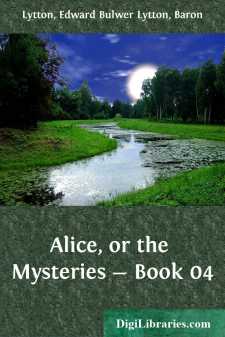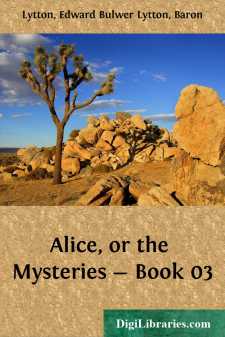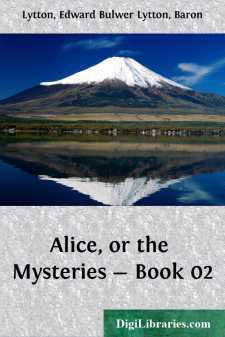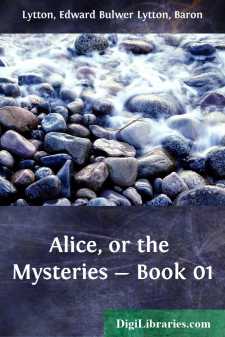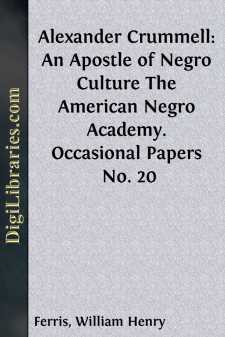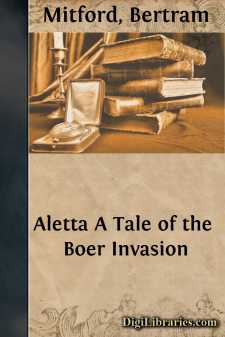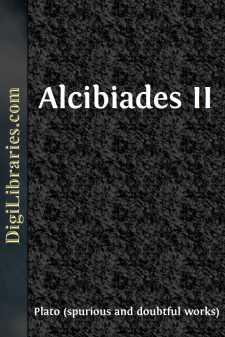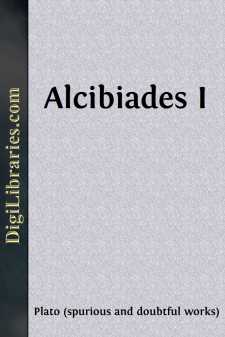Fiction
- Action & Adventure 180
- Biographical 15
- Christian 59
- Classics
- Coming of Age 5
- Contemporary Women 3
- Erotica 8
- Espionage/Intrigue 12
- Fairy Tales, Folklore & Mythology 236
- Family Life 169
- Fantasy 117
- Gay 1
- General 596
- Ghost 32
- Historical 808
- Horror 43
- Humorous 160
- Jewish 25
- Legal 4
- Medical 22
- Mystery & Detective 315
- Political 49
- Psychological 41
- Religious 64
- Romance 159
- Sagas 11
- Science Fiction 730
- Sea Stories 113
- Short Stories (single author) 537
- Sports 10
- Suspense 1
- Technological 8
- Thrillers 2
- Urban Life 31
- Visionary & Metaphysical 1
- War & Military 173
- Westerns 199
Classics Books
Sort by:
CHAPTER I. ABROAD uneasy, nor content at home. . . . . . . And Wisdom shows the ill without the cure. HAMMOND: Elegies. TWO or three days after the interview between Lord Vargrave and Maltravers, the solitude of Burleigh was relieved by the arrival of Mr. Cleveland. The good old gentleman, when free from attacks of the gout, which were now somewhat more frequent than formerly, was the...
more...
CHAPTER I. YOU still are what you were, sir! . . . . . . . . . With most quick agility could turn And return; make knots and undo them, Give forked counsel.—Volpone, or the Fox. BEFORE a large table, covered with parliamentary papers, sat Lumley Lord Vargrave. His complexion, though still healthy, had faded from the freshness of hue which distinguished him in youth. His features,...
more...
CHAPTER I. THERE is continual spring and harvest here— Continual, both meeting at one time; For both the boughs do laughing blossoms bear, And with fresh colours deck the wanton prime; And eke at once the heavy trees they climb, Which seem to labour under their fruit's load. SPENSER: The Garden of Adonis. Vis boni In ipsa...
more...
CHAPTER I. Who art thou, fair one, who usurp'st the place Of Blanch, the lady of the matchless grace?—LAMB. IT was towards the evening of a day in early April that two ladies were seated by the open windows of a cottage in Devonshire. The lawn before them was gay with evergreens, relieved by the first few flowers and fresh turf of the reviving spring; and at a distance, through an opening...
more...
by:
Anonymous
ALICE COGSWELL BEMIS Alice Cogswell Bemis came from a long line of good British stock. She was in the eighth generation from John Cogswell, who was born at Westbury Leigh, Wiltshire, in 1592. He was a man of standing and of considerable inherited property. Among the latter were "The Mylls," called "Ripond," situated in the parish of Fromen, Selwood, together with the homestead and...
more...
I WALKING PAPERS Through the suave, warm radiance of that afternoon of Spring in England a gentleman of modest and commonly amiable deportment bore a rueful countenance down Piccadilly and into Halfmoon street, where presently he introduced it to one whom he found awaiting him in his lodgings, much at ease in his easiest chair, making free with his whiskey and tobacco, and reading a slender brown...
more...
ALEXANDER CRUMMELLAN APOSTLE OF NEGRO CULTURE. A noted English lawyer-author has declared that the twelfth chapter of Ecclesiastes is the final word of the world’s philosophy; that no ancient or modern thinker has uttered a profounder word. And in the seventh verse of that chapter it reads, “Then shall the dust return to the earth as it was; and the spirit shall return unto God who gave it.”...
more...
by:
Bertram Mitford
Chapter One. Book I—The Transvaal Emissary. The delegate from Pretoria was in full blast. The long room was packed full—full of male Boers of all ages: that is to say, from those in earliest manhood to the white-bearded great-grandfathers of the community—Boers of every type, Boers hairy, Boers shaven, moleskin-clad and collarless Boers, and Boers got up with near approach to European neatness;...
more...
APPENDIX II. The two dialogues which are translated in the second appendix are not mentioned by Aristotle, or by any early authority, and have no claim to be ascribed to Plato. They are examples of Platonic dialogues to be assigned probably to the second or third generation after Plato, when his writings were well known at Athens and Alexandria. They exhibit considerable originality, and are remarkable...
more...
APPENDIX I. It seems impossible to separate by any exact line the genuine writings of Plato from the spurious. The only external evidence to them which is of much value is that of Aristotle; for the Alexandrian catalogues of a century later include manifest forgeries. Even the value of the Aristotelian authority is a good deal impaired by the uncertainty concerning the date and authorship of the...
more...


